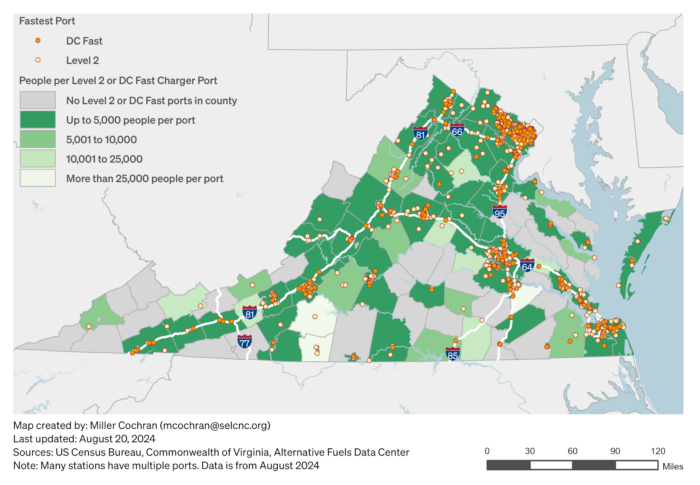2025 Virginia General Assembly
SELC’s priorities and what you need to know
The Virginia General Assembly’s 2025 session began January 8, 2025, and ends February 22. While this is a shorter session, the stakes are high as the state heads into its last legislative session under the Youngkin administration and decision makers face choices that could make or break Virginia’s place as a clean energy leader in the South. We and other groups across the state want the state to remain on top to help ensure a better future for the environment, health, and communities.
That’s why our priorities this session reflect what an overwhelming majority of Virginians care about – moving swiftly toward cleaner energy, reducing dependence on methane gas, and defending the mechanisms already in place to help with the transition.
Getting control of data center development
Virginia is known as the data center capital of the world. Home to at least 300 data centers, with 90% of those in Northern Virginia, these facilities use large amounts of water, occupy large parcels of land, and require vast amounts of electricity. A recent legislative report raised serious doubt as to whether Virginia’s electric system can accommodate this massive demand.
Meanwhile, monopoly utilities operating in the state use data centers’ energy needs to justify continued and expanded use of methane gas. In its 2024 Integrated Resource Plan (IRP) for the state, Dominion Energy said data center growth is driving record demand, with the utility claiming that this growth will require 6,000 MW of new methane gas power plants. Dominion’s claim should not be taken at face value, but it shows that utilities like Dominion view data centers as a huge opportunity to build expensive, polluting facilities—driving up our bills while dragging us backward on climate.
A key factor in the data center industry’s growth in Virginia has been the state’s available tax exemption. Virginia was an early adopter of such a policy in 2008 and has since expanded its scope. In its current form, the conditions for the incentive are minimal and data center companies can easily claim the exemption.
During this legislative session SELC and its partners are focused on proposals to (i) increase transparency at the local and state level about data center impacts; (ii) redesign the tax exemption to be far more selective about the types of data centers Virginia attracts; and (iii) provide early oversight by the State Corporation Commission (SCC) of these high energy projects to ensure they do not threaten our electric system or increase bills for other customers.
Moving solar forward
SELC is excited to support three bills that will work together to expand distributed generation, increase community access to renewable energy, and advance clean energy workforce development.
Among other things, the Distributed Generation Expansion Act will increase the size of a distributed resource from 1 MW to 3 MW, increase the role of these small projects, and incentivize more solar development on previously developed sites.
The CARE Act (Community Access to Renewable Energy) requires utilities to propose a Community Power Program that aggregates distributed energy resources such as electric vehicles; residential, commercial, and industrial solar and battery storage; and heat pumps to help meet peak demand. Participating customers would get bill credits when their resources help meet peak demand.
The Clean Energy Apprenticeship Act requires 15% of workers on new clean energy projects to be qualified apprentices and requires that developers of new clean energy projects pay workers prevailing wage.
EV charging needs a boost
Access to electric vehicle (EV) charging in rural areas and underserved urban areas is critical to provide all Virginians access to the benefits of EVs. To ensure convenient charging is available across the Commonwealth, SELC supports a bill establishing a charging infrastructure program, which would provide developers with grants covering up to 70% of the costs associated with the installation of public EV charging stations in rural and other underserved localities, as well as state parks and near federal lands.

This program would help more Virginians to choose an EV by filling critical gaps in the Commonwealth’s EV charging network. The program would also boost tourism and economic development by giving EV drivers confidence that they will be able to charge at more destinations. The bill directs VDOT to prioritize installation at locations with existing businesses and public amenities such as convenience stores, visitor centers, food retailers, and small businesses. The program is designed to complement federal funding for EV charging and ensure that all Virginia communities benefit from the EV transition.
Defending prior wins
During the previous administration of Governor Northam, the General Assembly made significant progress in setting the state up for a transition to cleaner energy sources. That progress has been under attack by the Youngkin administration. In the past three years the Youngkin administration has removed the state from the Regional Greenhouse Gas Initiative (RGGI), attempted to weaken the Virginia Clean Economy Act, and in June, Governor Youngkin announced his plan to override the law that will substantially cut tailpipe pollution by making Virginia a Clean Cars state.
The General Assembly has defeated legislative attempts to weaken or repeal these laws.
And in November, the Circuit Court of Floyd County ruled that the administration’s regulatory action removing Virginia from RGGI was “unlawful and without effect.” The court explained that the “only body with the authority to repeal the RGGI Regulation would be the General Assembly . . . because a statute, the RGGI Act, requires the RGGI Regulation to exist.”
This decision came after the Virginia State Air Pollution Control Board, Department of Environmental Quality, and its director, removed the state from RGGI in June 2023.
SELC will fight to maintain Virginia’s climate leadership and ensure the Commonwealth does not abandon these commonsense climate solutions.
As these priorities evolve during the General Assembly session, be on the lookout for updates SELC and other organizations and chances to support these pressing issues that will help shape Virginia for years to come.
